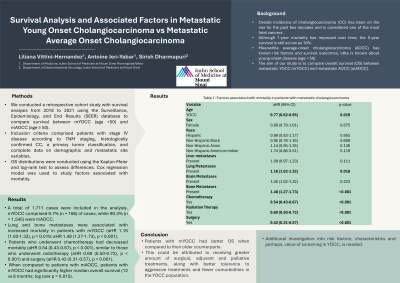Monday Poster Session
Category: Biliary/Pancreas
P1766 - Survival Analysis and Associated Factors in Metastatic Young Onset Cholangiocarcinoma vs Metastatic Average Onset Cholangiocarcinoma
Monday, October 28, 2024
10:30 AM - 4:00 PM ET
Location: Exhibit Hall E

Has Audio

Liliana Vittini-Hernandez, MD
Icahn School of Medicine at Mount Sinai Morningside/West
New York, NY
Presenting Author(s)
Liliana Vittini-Hernandez, MD1, Antoine Jeri-Yabar, MD2, Sirish Dharmapuri, MD3
1Icahn School of Medicine at Mount Sinai Morningside/West, New York, NY; 2Icahn School of Medicine at Mount Sinai Morningside/West, Manhattan, NY; 3Mount Sinai West, Icahn School of Medicine at Mount Sinai, New York, NY
Introduction: Overall incidence of cholangiocarcinoma (CC) has been on the rise for the past few decades, and is considered one of the most fatal cancers. Although 1-year mortality has improved over time, the 5-year survival is still as low as 10%. Young-onset cholangiocarcinoma (YOCC) is defined as cholangiocarcinoma diagnosed prior to age 50. Meanwhile average-onset cholangiocarcinoma (AOCC) has known risk factors and survival outcomes, little is known about young-onset disease. Our study compared overall survival (OS) between metastatic YOCC (mYOCC) and metastatic AOCC (mAOCC).
Methods: We conducted a retrospective cohort study with survival analysis from 2018 to 2021 using the Surveillance, Epidemiology, and End Results (SEER) database to compare survival between mYOCC (age < 50) and mAOCC (age ≥ 50). Inclusion criteria comprised patients with stage IV disease according to TNM staging, histologically confirmed cholangiocarcinoma, a primary tumor classification, and complete data on demographic and metastatic site variables. Overall survival distributions were conducted using the Kaplan-Meier and log-rank test to assess differences. Cox regression model was used to study factors associated with mortality.
Results: A total of 1,711 cases were included in the analysis. mYOCC comprised 9.7% (n = 166) of cases, while 90.3% (n = 1,545) were mAOCC. Lung and bone metastases were associated with increased mortality in patients with mYOCC (aHR 1.16 (1.02-1.32), p = 0.019; aHR 1.48 (1.27-1.73), p < 0.001). Patients who underwent chemotherapy had decreased mortality (aHR 0.54 (0.43-0.67), p < 0.001), similar to those who underwent radiotherapy (aHR 0.60 (0.50-0.72), p < 0.001) and surgery (aHR 0.42 (0.31-0.57), p < 0.001). When compared to patients with mAOCC, patients with mYOCC had significantly higher median overall survival (12 vs 8 months; log rank p = 0.015).
Discussion: Patients with mYOCC had better OS when compared to their older counterparts. This could be attributed to receiving greater amount of surgical, adjuvant and palliative treatments, along with better tolerance to aggressive treatments and fewer comorbidities in the YOCC population. Additional investigation into risk factors, characteristics and perhaps, value of screening in YOCC, is needed.
Disclosures:
Liliana Vittini-Hernandez, MD1, Antoine Jeri-Yabar, MD2, Sirish Dharmapuri, MD3. P1766 - Survival Analysis and Associated Factors in Metastatic Young Onset Cholangiocarcinoma vs Metastatic Average Onset Cholangiocarcinoma, ACG 2024 Annual Scientific Meeting Abstracts. Philadelphia, PA: American College of Gastroenterology.
1Icahn School of Medicine at Mount Sinai Morningside/West, New York, NY; 2Icahn School of Medicine at Mount Sinai Morningside/West, Manhattan, NY; 3Mount Sinai West, Icahn School of Medicine at Mount Sinai, New York, NY
Introduction: Overall incidence of cholangiocarcinoma (CC) has been on the rise for the past few decades, and is considered one of the most fatal cancers. Although 1-year mortality has improved over time, the 5-year survival is still as low as 10%. Young-onset cholangiocarcinoma (YOCC) is defined as cholangiocarcinoma diagnosed prior to age 50. Meanwhile average-onset cholangiocarcinoma (AOCC) has known risk factors and survival outcomes, little is known about young-onset disease. Our study compared overall survival (OS) between metastatic YOCC (mYOCC) and metastatic AOCC (mAOCC).
Methods: We conducted a retrospective cohort study with survival analysis from 2018 to 2021 using the Surveillance, Epidemiology, and End Results (SEER) database to compare survival between mYOCC (age < 50) and mAOCC (age ≥ 50). Inclusion criteria comprised patients with stage IV disease according to TNM staging, histologically confirmed cholangiocarcinoma, a primary tumor classification, and complete data on demographic and metastatic site variables. Overall survival distributions were conducted using the Kaplan-Meier and log-rank test to assess differences. Cox regression model was used to study factors associated with mortality.
Results: A total of 1,711 cases were included in the analysis. mYOCC comprised 9.7% (n = 166) of cases, while 90.3% (n = 1,545) were mAOCC. Lung and bone metastases were associated with increased mortality in patients with mYOCC (aHR 1.16 (1.02-1.32), p = 0.019; aHR 1.48 (1.27-1.73), p < 0.001). Patients who underwent chemotherapy had decreased mortality (aHR 0.54 (0.43-0.67), p < 0.001), similar to those who underwent radiotherapy (aHR 0.60 (0.50-0.72), p < 0.001) and surgery (aHR 0.42 (0.31-0.57), p < 0.001). When compared to patients with mAOCC, patients with mYOCC had significantly higher median overall survival (12 vs 8 months; log rank p = 0.015).
Discussion: Patients with mYOCC had better OS when compared to their older counterparts. This could be attributed to receiving greater amount of surgical, adjuvant and palliative treatments, along with better tolerance to aggressive treatments and fewer comorbidities in the YOCC population. Additional investigation into risk factors, characteristics and perhaps, value of screening in YOCC, is needed.
Disclosures:
Liliana Vittini-Hernandez indicated no relevant financial relationships.
Antoine Jeri-Yabar indicated no relevant financial relationships.
Sirish Dharmapuri indicated no relevant financial relationships.
Liliana Vittini-Hernandez, MD1, Antoine Jeri-Yabar, MD2, Sirish Dharmapuri, MD3. P1766 - Survival Analysis and Associated Factors in Metastatic Young Onset Cholangiocarcinoma vs Metastatic Average Onset Cholangiocarcinoma, ACG 2024 Annual Scientific Meeting Abstracts. Philadelphia, PA: American College of Gastroenterology.
